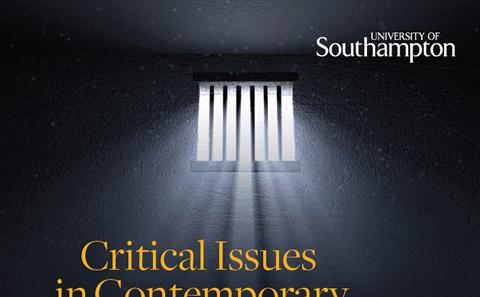Critical Issues in Contemporary Penal Policy Event

- Time:
- 10:00 - 16:30
- Date:
- 22 October 2014
- Venue:
- The Royal Society 6-9 Carlton House Terrace London SW1Y 5AG
For more information regarding this event, please email Professor Jenny Fleming at J.Fleming@soton.ac.uk .
Event details
The Institute of Criminal Justice Research is proud to present this conference on the topic of ‘Critical Issues in Contemporary Penal Policy’. The day will be divided into three themes for discussion– Imprisonment of Dangerous Offenders, Future of Probation and Youth Justice.
Register via the link: http://go.soton.ac.uk/60d
Imprisonment of Dangerous Offenders:
This session considers an issue of critical importance to criminal justice policymakers and practitioners: the imprisonment of dangerous offenders. The prominent indeterminate Imprisonment for Public Protection (IPP) sentence was abolished by the Legal Aid, Sentencing and Punishment of Offenders Act 2012, but substantial issues remain. The legislation was not retrospective and over 5,200 IPP prisoners remain in the prison estate. Further, many important developments are currently underway, encompassing the Offender Personality Disorder Pathway (OPDP), Life Sentences, Release on Temporary Licence and Close Supervision Centres (CSC).
This session will explore:
(1) How the Parole Board, prison service and probation service best tackle the practical challenges posed by this cohort;
(2) The appropriate response to the perceived unfairness of the IPP sentence for remaining prisoners;
(3) The Development of the Offender Personality Disorder Pathway;
(4) Release on Temporary Licence, Close Supervision Centres and other institutional responses to ‘dangerous offenders’.
Future of Probation:
For over one hundred years, the punishment and supervision of all offenders in the community in England and Wales has been the sole responsibility of a public sector probation service. In recent years, this responsibility was organized through 35 probation trusts. As part of the Government’s Transforming Rehabilitation programme, however, from June 2014 these trusts have been replaced by 21 Community Rehabilitation Companies (CRCs). The contracts to run the CRCs are currently being put to out to tender by the Ministry of Justice, and include financial incentives for reducing re-offending (payment by results). These CRCs will supervise most – low to medium risk – offenders. The new National Probation Service will focus upon the management of the most dangerous offenders, while retaining ultimate responsibility for public protection – including deciding upon the allocation of offenders to CRCs – and for providing courts with pre-sentence reports.
This session will consider the wide-ranging consequences and potential implications of this new mixed economy in probation provision:
(1) What do these changes signify for the involvement of, and partnership working between, the statutory, private, voluntary, and community sectors in probation?;
(2) What do these changes mean for the job satisfaction and security of the probation professional?;
(3) What do these changes mean for offenders and their experiences of punishment and supervision in the community?;
(4) What are the opportunities and risks of this emerging landscape in community corrections?; and
(5) Will payment by results prove to be any more effective in reducing re-offending?
Youth Justice:
This session will focus on one of the most significant developments in penal policy as it relates to children and young people: The Government’s proposal to introduce a network of large ‘Secure Colleges’ to detain 12 to 17 year old boys and girls. In the decade from 1993 to 2003, encompassing both Conservative and Labour majority Governments, the number of young people in custody rose by ninety percent to a figure of around 3000. England and Wales incarcerated more young people than virtually every other country in Western Europe. Since 2008, however, there has been a remarkable turnaround. Under, Gordon Brown’s Labour and the Conservative and Liberal Democrat Coalition Governments the population has fallen steadily back to around 1200, a level not seen since the very early 1990s. This is the context within which the ‘Secure Colleges’ policy has been introduced.
The session will consider a number of key questions:
(1) What does this policy signal about the direction of youth justice policy in the years ahead?;
(2) What will the effect of the introduction of these institutions be on sentencing practice and the numbers in custody?;
(3) What will be the effect on the conditions under which young people are kept in custody?;
(4) Will these Institutions improve educational, health, social and offending related outcomes for young people?;
(5) What alternatives are there to improve the way in which young people are dealt with in custody?
Links to external websites
The University cannot accept responsibility for external websites.
Speaker information
Sir David Calvert Smith,Chair, Parole Board of England and Wales,Imprisonment of Dangerous Offenders
Nick Hardwick CBE,HM Chief Inspector of Prisons,Imprisonment of Dangerous Offenders
Crispin Blunt MP,Member of Parliament for Reigate,Imprisonment of Dangerous Offenders
Andrew Bridges CBE,Former HM Chief Inspector of Probation,Future of Probation
Professor Paul Senior,Director, Hallam Centre for Community Justice, Sheffield Hallam University,Future of Probation
Paul McDowell,HM Chief Inspector of Probation,Future of Probation
Penelope Gibbs,Director, Transform Justice,Youth Justice
Frances Crook,The Howard League,Youth Justice
Professor Roger Smith,Professor of Social Work, Durham University,Youth Justice
Darren Tierney,Director, Youth Justice and Foreign National Offenders,Youth Justice